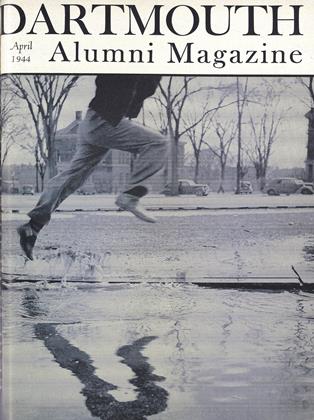Hovey Wrote Alma Mater 50 Years Ago This Month
A HALF CENTURY AGO Richard Hovey, then twenty-nine, paced the floor of his handsome room at 601 Boylston Street under the very eaves of the new Boston Public Library. He walked back and forth, smoking one after another the cigarettes he rolled with Bob White tobacco. Then he sank into a chair, "his eyes shining like two moons" as they saw the Dartmouth he was creating. Across the room his wife of less than three months watched him and set down the details in a letter to his mother. Three days later, on Easter Sunday, he wrote off the fair copy of Men of Dartmouth which is here reproduced.
An invalid clergyman of the class of 1844, troubled that he had no money to give to Dartmouth, had seen that he might make another contribution. He stirred some of the Boston alumni into activity, and at a meeting of the Dartmouth Luncheon Club at the Tremont House, Feb. 3, 1894, "it was voted that the president appoint a committee of three to obtain a Dartmouth song, special mention being made of Richard Hovey '85, whose marriage with Mrs. Henrietta Russell, high priestess of the temple Delsarte, has created so much interest." At Commencement, 1896, a committee headed by "Clothespin Dick" Richardson, his dear friend and teacher, awarded a prize of $100 to Hovey for "the best original short poem appropriate for a distinctively Dartmouth song." The musical setting was not found so easily. Hovey, who had sailed for England and France a few weeks after writing the poem, turned down the first offering as "too like a psalm tune." He wanted to break with the traditional and lugubrious college hymn, and was delighted by the setting of the young English composer Marie Wurm, whose score for Eleazar is still used. But her music was refused because she was not a Dartmouth man though, asTtovey remarked, no one could blame her for that. So the competition languished, Hovey demanding good "workmanlike" music and the committee dissatisfied with all offerings.
To excite competition the Trustees in the autumn of 1896 offered the Baker prize of $100 for music "suitable for chorus or out-of-door singing." At length the prize was awarded to Addison F. Andrews '78, the musical editor of E. O. Grover's Dartmouth Songs, then recently published, for the setting included in that volume. Andrews, who had submitted a more conventional score in the competition, was amazed. He wrote to Grover: "I had no idea of winning, especially not with that setting; because the music did not at all fulfill the conditions of the prize. What was wanted was music on the style of 'Auld Lang Syne,' which antique and toothless alumni, with no voices, could pretend to sing at alumni reunions." Certainly it was not for such that the present, and one hopes final, setting was written by Harry Wellman '07. The stirring swing of this was first heard publicly when the whole company of "The Promenaders" sang it as finale to their show in the Commencement week of 1908.
Dartmouth has been blessed among colleges by the songs Richard Hovey left her. She was to him not a sentimental memory but a great idea. He did not hesitate to criticize her, for as he wrote to Dr. Tucker concerning the very next poem he wrote, the Dartmouth Ode for the one hundred twenty-fifth anniversary, he wanted Dartmouth to be still greater and to pioneer the way into new forms of education. That very seriousness rescues his. songs from the maudlin triteness of the usual college song. It might be said to have shaped the very College, for the symbols a college takes to itself create it in their image. The Hanover of hill winds, the lone and silent North, the great white cold, Nature invented, but Hovey disclosed. It was an act of pure imagination. As an undergraduate he had loved wind and winter no more than another, and he had stolen illegally long Christmas holidays in Washington. Yet, just at that moment when the natural world was coming under the control of men so that they needed an ideal of vigorous, masculine existence and were almost ready for the modern glorification of Winter, Hovey captured these for Dartmouth. In the songs he wrote he made men aware of a cleanness, a virility, and a comradeship which, however unattained, keep before men a vision of what Dartmouth might be.
THE ORIGINAL HOVEY MANUSCRIPT NOW PRESERVED IN THE COLLEGE ARCHIVES
RICHARD HOVEY '85 from the portrait by George A. Thompson '92 now hung in the Richard Hovey Grill in Thayer Hall.
PROFESSOR OF ENGLISH
Professor Macdonald is engaged on a life of Richard Hovey. If any alumni have significant material they do not want to give the College, he would be grateful for knowledge of that material. The MAGAZINE editors hope to persuade Professor Macdonald to write more fully about Dartmouth's poet laureate in some future issue. ,
 View Full Issue
View Full Issue
More From This Issue
-
 Article
ArticleCOLLEGE MEN IN POLITICS
April 1944 By DAYTON D. McKEAN -
 Article
ArticleSANBORN ENGLISH HOUSE
April 1944 By LEON BURR RICHARDSON '00 -
 Class Notes
Class Notes1918
April 1944 By ERNEST H. EARLEY, DONALD L. BARR -
 Class Notes
Class Notes1935
April 1944 By ENSIGN JOHN D. GILCHRIST JR., BOBB CHANEY -
 Lettter from the Editor
Lettter from the EditorLetters from Dartmouth Men in the Armed Forces
April 1944 By H. F. W. -
 Class Notes
Class Notes1919
April 1944 By J. KENNETH HUNTINGTON
ALLAN H. MACDONALD
Article
-
 Article
ArticleCOLLEGE NOTES
December, 1908 -
 Article
ArticleSenior Elected State Legislator
JANUARY 1971 -
 Article
ArticleFiedler Near The Roof
April 1993 -
 Article
ArticleYoung in an Olds World
JANUARY 2000 -
 Article
ArticleDartmouth 26, Columbia 13
December 1942 By C. E. W. -
 Article
ArticleIs That Photo a Fake?
September | October 2013 By Hany Farid



